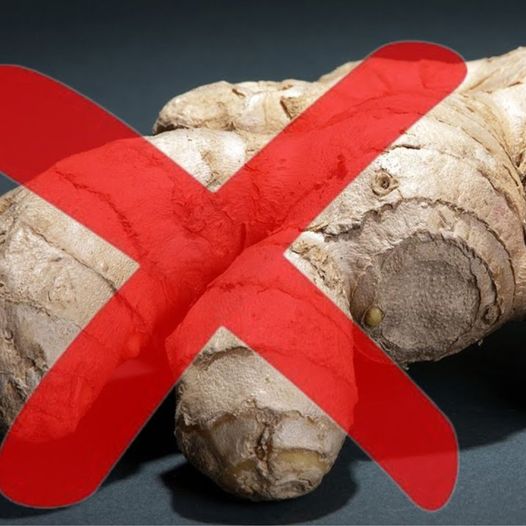Ginger, a popular spice known for its distinctive flavor and impressive health benefits, is a common ingredient in many kitchens around the world. It is often praised for its anti-inflammatory properties, digestive aid, and ability to boost the immune system. However, while ginger is generally considered safe for most people, there are certain health conditions where it might not be the best choice. Like any other natural remedy or supplement, it’s important to know when and how to use ginger. This guide provides insight into the health conditions where you should think twice before using ginger, ensuring that you’re using it in the safest way possible.
1. Blood Thinning Issues
One of the most well-known properties of ginger is its ability to act as a natural blood thinner. This property can be beneficial for some individuals, particularly those who are at risk of developing blood clots. However, for people on blood-thinning medications like warfarin, aspirin, or other anticoagulants, this blood-thinning effect could increase the risk of bleeding or bruising.
If you are on prescribed blood thinners, it is essential to consult your healthcare provider before incorporating ginger into your diet. Combining ginger with these medications could make your blood too thin, potentially leading to complications such as excessive bleeding or hemorrhage. This is particularly concerning if you have a planned surgery or are prone to easy bruising or bleeding.
2. Gallstones
Ginger is known to stimulate the production of bile, which helps in the digestion and breakdown of fats. This is beneficial for healthy digestion and can aid in alleviating nausea or indigestion. However, for individuals who suffer from gallstones, this increased bile production may trigger discomfort, pain, or even more severe complications.
Gallstones are hardened deposits that form in the gallbladder and can block bile ducts, leading to severe pain, infection, or inflammation. When you consume ginger, it can stimulate the gallbladder to release more bile, which may lead to increased pain or potential bile duct obstruction. If you have gallstones, it is advisable to limit your ginger intake and speak with your doctor about the best dietary choices for your condition.
3. Low Blood Pressure and Heart Conditions
Ginger has long been known for its ability to lower blood pressure. For many individuals with high blood pressure (hypertension), ginger can be a useful addition to their diet, as it may help reduce systolic and diastolic blood pressure. However, for those who already have low blood pressure (hypotension) or certain heart conditions, ginger might cause their blood pressure to drop too low, which could result in dizziness, fainting, or other related symptoms.
Additionally, for people with heart conditions such as arrhythmias or those taking medications to manage heart function, ginger may interfere with certain medications, such as beta-blockers or calcium channel blockers. If you are dealing with heart issues or low blood pressure, it is crucial to talk to your doctor before consuming large amounts of ginger.
4. Pregnancy
Ginger has often been recommended to pregnant women to help alleviate the discomfort of morning sickness, which is common during the early stages of pregnancy. Its anti-nausea properties make it a popular choice for women dealing with nausea and vomiting. However, while small amounts of ginger are generally considered safe, consuming large quantities of ginger during pregnancy can be risky, especially close to labor.
High doses of ginger have been associated with an increased risk of bleeding, which can be dangerous for both the mother and the baby, particularly in the third trimester. Some studies suggest that large amounts of ginger may affect hormone levels or interfere with uterine contractions, potentially leading to premature labor or complications during delivery. Therefore, pregnant women should limit their ginger intake and always consult their doctor before using ginger as a remedy for morning sickness or other pregnancy-related issues.
5. Sensitive Stomach or Digestive Issues
While ginger is often recommended for digestive problems such as bloating, nausea, and indigestion, it can also irritate the stomach lining in some individuals, especially if consumed in large quantities. People who have sensitive stomachs, acid reflux, or gastrointestinal disorders such as peptic ulcers or gastroesophageal reflux disease (GERD) may find that ginger exacerbates their symptoms.
The spicy compounds in ginger, particularly gingerol, can stimulate the stomach lining, which may lead to irritation, heartburn, or even an upset stomach. For individuals who are prone to these conditions, it’s best to use ginger in moderation or consult with a healthcare provider before incorporating it into your diet. In some cases, alternatives like peppermint or chamomile tea might be gentler on the stomach.
6. Allergic Reactions
Although rare, some individuals may experience allergic reactions to ginger. Symptoms of an allergic reaction can include skin rashes, hives, swelling of the face or lips, or even difficulty breathing. If you have a known allergy to other spices or plants in the Zingiberaceae family, such as turmeric or cardamom, you may also be more likely to experience an allergic reaction to ginger.
If you experience any of these symptoms after consuming ginger, it’s important to seek medical attention immediately and stop using ginger. Allergic reactions can be severe, and in some cases, they can cause anaphylaxis, which requires emergency treatment.
7. Interactions with Medications
In addition to its blood-thinning effects, ginger can interact with a variety of medications, especially those related to the heart, blood pressure, and diabetes. For instance, ginger may enhance the effects of blood sugar-lowering medications, which could lead to dangerously low blood sugar levels in individuals with diabetes. Additionally, ginger can affect the metabolism of certain medications, leading to increased or decreased effectiveness.
If you are taking medications for diabetes, blood pressure, or cholesterol management, it’s important to consult with your doctor before using ginger as a supplement or adding it regularly to your diet. Your healthcare provider can guide you on how to safely incorporate ginger into your routine without interfering with your medications.
Tips for Safe Ginger Use
If you enjoy ginger’s flavor and health benefits but are concerned about potential health risks, here are some tips to use ginger safely:
- Consult Your Doctor: Before incorporating ginger into your diet, especially if you have existing health conditions, always consult your healthcare provider. They can advise you on the right amount to consume and ensure it won’t interfere with your medications or exacerbate any existing health issues.
- Start Small: If you’re new to using ginger, start with small amounts to gauge how your body reacts. This will help you identify any potential side effects or adverse reactions.
- Moderation is Key: Ginger is most beneficial when used in moderation. Rather than consuming large quantities, use ginger as a seasoning or incorporate it into dishes, teas, or smoothies in small amounts.
- Alternative Options: If you find that ginger doesn’t agree with you, consider using other herbs or spices that may have similar benefits without the risks. For example, peppermint or chamomile can help with digestion and nausea, while turmeric offers anti-inflammatory properties.
- Look for Signs of Overuse: If you notice any adverse reactions such as an upset stomach, dizziness, or changes in blood pressure, it may be a sign that you’re consuming too much ginger. Reduce your intake and monitor your symptoms.
Conclusion
Ginger is a powerful and versatile spice with numerous health benefits. However, like any other natural remedy, it’s important to use it wisely, considering your individual health needs and conditions. By following the proper precautions and consulting your doctor, you can enjoy the many advantages of ginger without the risks. Whether you’re using it to enhance your cooking or to support your health, understanding when to be cautious with ginger ensures that you can enjoy its benefits safely and effectively.





